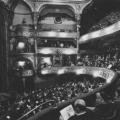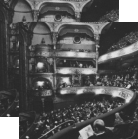Ilona Fried
(KURDI P/C 1; 113–120, KURDI P/C 2; 89–93, MÜLLER P/C 3; 147–149, MÜLLER P/C 3; 148–150.)
At the end of the nineteenth century and in the early twentieth century, the international theatre was greatly affected by the Italian theatre, due to the influence of Eleonora Duse and other “great actors”. Most of these leading actors were also the leaders of various touring theatre companies. Gradually, however, there came a need to create a new kind of theatre, and, as a result, the director’s theater appeared in several European countries, even though this process was somewhat delayed in Italy. Meanwhile, simultaneously with the birth of modern mass culture, the film and the radio became wide-spread, soon to be followed by experimental television broadcasts and the transmission of major sporting events.
At the beginning of the century, primarily plays by Roberto Bracco and by Gabriele D’Annunzio became well-known in Europe. In the twenties, Luigi Pirandello‘s plays represented an internationally recognized new canon. In this study, some of the special features of the modern Italian drama are examined as a continuation of my ”walks” that were originally exploring the development of the Italian genre of fiction.
The spread of drama had been influenced by the delay in the formation of a standard Italian language. Indeed, the popular theatrical genre in the nineteenth century was the opera, which, compared to drama written in prose, allowed for a more literary type libretto, the language of which was rather distant from that of everyday, spoken communication where dialects were often used until the mid-twentieth century. In fact, dialect plays, dialect perfomances remained an important part of the Italian theatre, despite the campaigns of the Fascist era.
As Maria Kurdi stated in relation to the English-speaking theatre, “periphery” is strongly represented in twentieth century Italian drama as well. The poetic drama, which is a prominent dramatic genre in the Italian literary aesthetics of Benedetto Croce in the first half of the century, is represented primarily by the Abruzzese Gabriele D’Annunzio. The starting point of Pirandello’s early plays is the Sicilian theatre; he wrote several of his works in the Agrigento dialect in the 1910s. In his works, he designed the leading roles specifically for the Sicilian actors whom he knew, which was part of the reason why his fellow-countrymen rated his works so high: they believed that his works sounded better in their dialect than in the theatrical versions written by him in the modern Italian language.
Pirandello became world-famous through his plays written in the early twenties of the twentieth century, in the atmosphere of disillusionment after World War I. His plays, which played around with the perception of relativity, were connected to the theatre of the grotesque on one hand and to the Futurist theatre on the other. They conveyed the way of thinking of the time and reflected most of the issues intriguing the modern, international theatre. In them, we can easily discover the antecedents and contact points of many later playwrights, ranging from representatives of the existentialist drama to those of the absurd drama like Pinter‘s plays, or even to Edward Bond‘s contemporary plays.
In Pirandello’s works, the emphasis on “well-made plays” and the linear plots of salon dramas is replaced by self-reflective drama. Although the genres and the roles are based on the dramatic traditions, they also bring in significant innovations. At first sight, they are built up of contradictory elements in terms of formation, role types and genres. Pirandello directed a theatre in the mid-twenties. After the financial failure of that theatre, he went on a European tour with his theatre company. This way, he did not only experience theatre as an author but also as a stage manager, like several of his colleagues did at the time.
In my essay, special attention is given to two of Pirandellos’s plays, entitled Six Characters in Search of an Author and Mountain Giants; these plays create a new type of relationship with the audience and they require a new kind of reception.
In his own way, the bard and prophet D’Annunzio also represents a new kind of theatre attitude. Starting out from literary myths, he became a prominent politician and attracted crowds with his theatrical rituals. After his political failure, he retreated to the shore of Lake Garda, where he also lived his life as if still on stage.
Although with different approaches, the genre of the parabola, favored so much by Pirandello, continued to appear in the works of various Italian dramatists, from the philosophical dramas by Diego Fabbri to Ugo Betti‘s and Giovanni Testori’s works, in the ’50s and ’60s. Pier Paolo Pasolini‘s dramas also often focus on moral issues. Nobel Prize winner Dario Fo follows the tradition of comedies in his ironic style, responding at the same time to the current, often moral problems of society. His texts heavily depend on the moments of performance and to the acting achievements of his own and his wife’s, the excellent actress Franca Rame, who was “figlia d’arte” i.e. she came from an actor’s family.
Another important segment of the Italian drama is the Neapolitan drama, the Naples theatre. Naples has always been a centre, a city with great cultural and theatrical traditions, as attested by Eduardo De Filippo‘s theatre. Eduardo De Filippo was member of a great line of actors, an all-round theatrical person: actor, playwright and director, just like his brother, Peppino. (Their sister, Titina also worked together with them.) While the dialect used by Eduardo was understandable for everyone, the Neapolitan authors after him used a dialect, which they turned into a poetic form, featuring mainly marginalized characters, sometimes in downright cruel situations. Annibale Ruccello’s and Enzo Moscato’s drama is of this type: his characters move in a typical Neapolitan environment and they represent new social and existential aspects.
In actress, director and playwright Emma Dante’s unique theatre, the Palermo dialect is the basis. Her acting company, which bears the symbolic name of Costa Sud Occidentale, progressed from the periphery of the “South West Coast” to the centre of the Italian experimental theatre, and wonderfully demonstrates how to get “from text to performance”, and how the performance and the text can get mutually integrated.


